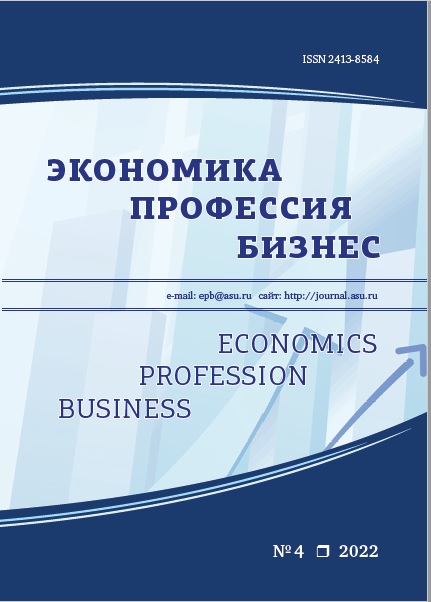ELECTRONIC MUNICIPALITY AS A MECHANISM OF INTERACTION OF THE AUTHORITY AND THE POPULATION
УДК 351.9:004.9
Abstract
The article is devoted to the main aspects of the development of a “smart” or “digital city”. To date, the approved “Strategy for the Development of the Information Society in the Russian Federation for 2017-2030” is being implemented quite fully. Within the framework of the “Smart City” concept, one of its components is identified and considered in the article: “Urban governance”. The authors believe that the human factor in urban management is fundamental. But in the “digital city” system, managers-officials need to use (own) information systems and programs that simplify and make transparent their actions in urban management. Such a tool, according to the authors, is the introduction of the “Electronic Government” system. E-government removes borders and frameworks in communication between officials and the population, makes their work visible and understandable, explains to the population the principles and procedure for the implementation of the activities of the state, region and municipalities. The article considers the economic and other prerequisites that contribute to the need for the use of e-government in urban management.
Downloads
Metrics
References
Сайт Умный город. URL: https://russiasmartcity.ru/
Козелло О. С., Костицына Ю. А. Инновационная концепция «Умный город»: опыт развитых стран и реализация в Российской Федерации // Молодой ученый. 2021. № 43 (385). С. 200-204.
Иншакова Е. Г. «Электронное правительство» в публичном управлении: административно-правовые проблемы организации и функционирования. Воронеж, 2015.
Аль-Габри Вадах Мохаммед. Электронное правительство: его перспективы, возможности и угрозы // Молодой ученый. 2016. № 15 (119). С. 337-342.
Голубева А. А. Электронное правительство: введение в проблему // Вестник Санкт-Петербургского университета. Менеджмент. 2005. № 2. С. 120-139.
Василенко И. А. Особенности формирования концепции «цифрового правительства» в политической науке и перспективы ее реализации в России // Государственное управление. Электронный вестник. 2020. № 82.
Рейтинг стран мира по уровню развития электронного правительства. Гуманитарная энциклопедия / Центр гуманитарных технологий. URL: https://gtmarket.ru/ratings/social-progress-index
Федеральный закон от 09.02.2009 № 8-ФЗ «Об обеспечении доступа к информации о деятельности государственных органов и органов местного самоуправления». URL: https://base.garant.ru/194874/
Аминов И. Р., Кравченко Р. В. К вопросу о месте муниципального права в системе российского права. // Фундаментальные и прикладные исследования в современном мире. 2014. Т. 4. № 8. С. 102-105.
Чихладзе Л. Т., Ларичев А. А. Местное самоуправление в России на распутье: динамика конституционной доктрины и правового регулирования // Вестник СПбГУ. Право. 2020. Т. 11. Вып. 2.
REFERENSES
Website Smart City/ URL: https://russiasmartcity.ru/
Kosello O. S., Kostitsyna Yu. A. Innovative concept “Smart City”: the experience of developed countries and implementation in the Russian Federation // Young scientist. 2021. No. 43 (385). Pp. 200-204.
Inshakova E. G. “Electronic government” in public administration: administrative and legal problems of organization and functioning. Voronezh, 2015.
Al-Gabri Wadah Mohammed. Electronic government: its prospects, opportunities and threats // Young scientist. 2016. No. 15 (119). Pp. 337-342.
Golubeva A. A. Electronic government: an introduction to the problem // Bulletin of St. Petersburg University. Management. 2005. No. 2. Pp. 120-139/
Vasilenko I. A. Features of the formation of the concept of “digital government” in political science and the prospects for its implementation in Russia // State Administration. Electronic Bulletin. 2020. No. 82.
Rating of the countries of the world according to the level of e-government development. Humanitarian Encyclopedia / Humanitarian Technology Center. URL: https://gtmarket.ru/ratings/social-progress-index
Federal Law of 09.02.2009 No. 8-FZ “On ensuring access to information about the activities of state bodies and local governments”. URL: https://base.garant.ru/194874/
Aminov I. R., Kravchenko R. V. To the question of the place of municipal law in the system of Russian law // Fundamental and applied research in the modern world. 2014. Vol. 4. No. 8. Pp. 102-105.
Chikhladze L. T., Larichev A. A. Local self-government in Russia at a crossroads: the dynamics of constitutional doctrine and legal regulation // Bulletin of St. Petersburg State University. Right. 2020. Vol. 11. Iss. 2.
Economics Profession Business is a golden publisher, as we allow self-archiving, but most importantly we are fully transparent about your rights.
Authors may present and discuss their findings ahead of publication: at biological or scientific conferences, on preprint servers, in public databases, and in blogs, wikis, tweets, and other informal communication channels.
Economics Profession Business (EPB) allows authors to deposit manuscripts (currently under review or those for intended submission to EPB) in non-commercial, pre-print servers such as ArXiv.
Authors who publish with this journal agree to the following terms:
- Authors retain copyright and grant the journal right of first publication with the work simultaneously licensed under a Creative Commons Attribution License that allows others to share the work with an acknowledgement of the work's authorship and initial publication in this journal.
- Authors are able to enter into separate, additional contractual arrangements for the non-exclusive distribution of the journal's published version of the work (e.g., post it to an institutional repository or publish it in a book), with an acknowledgement of its initial publication in this journal.
- Authors are permitted and encouraged to post their work online (e.g., in institutional repositories or on their website) prior to and during the submission process, as it can lead to productive exchanges, as well as earlier and greater citation of published work (See The Effect of Open Access).









